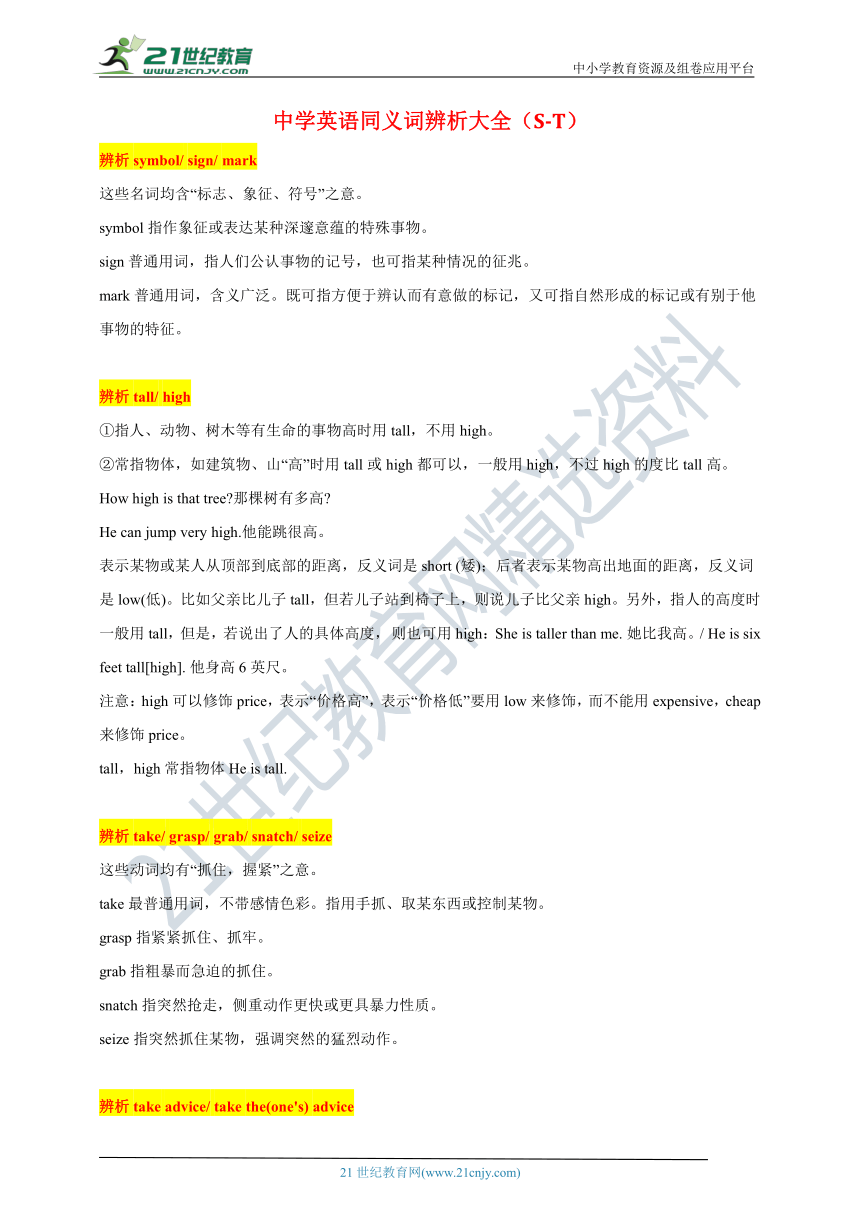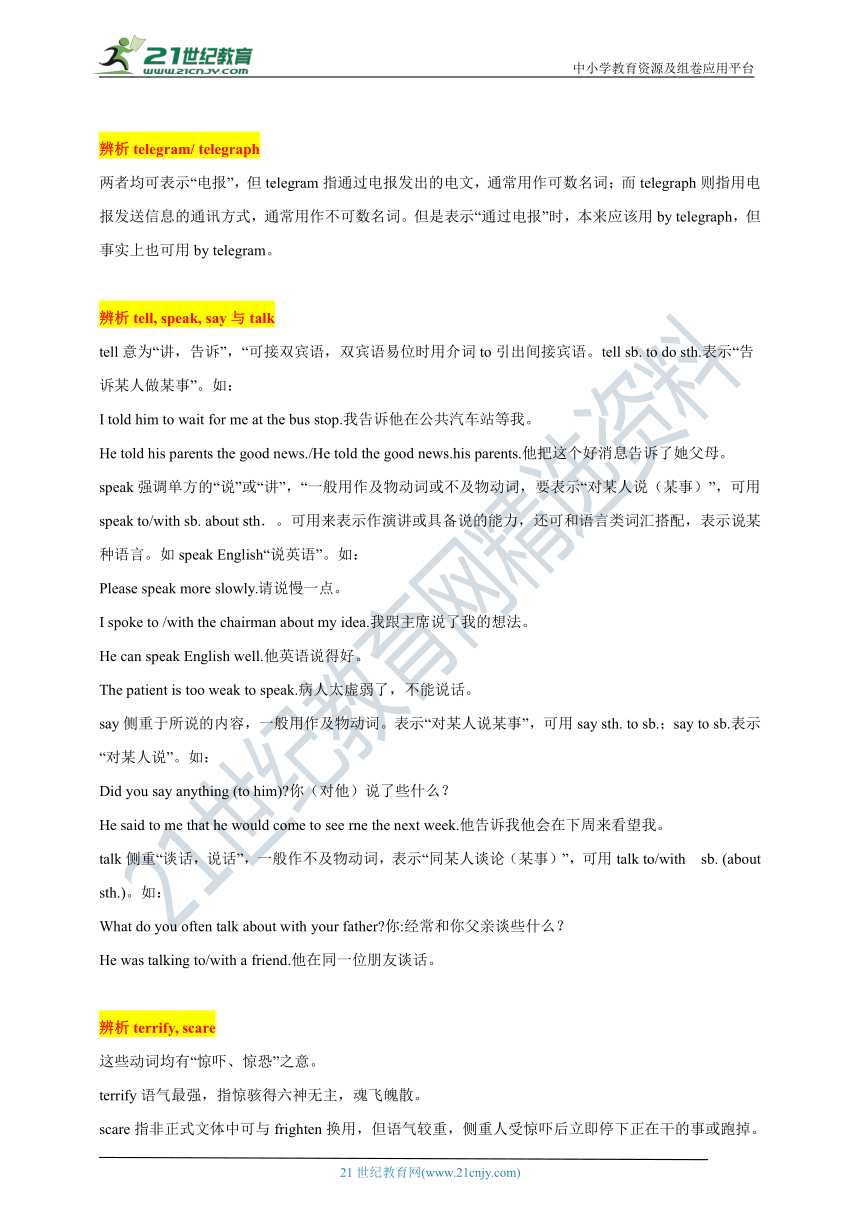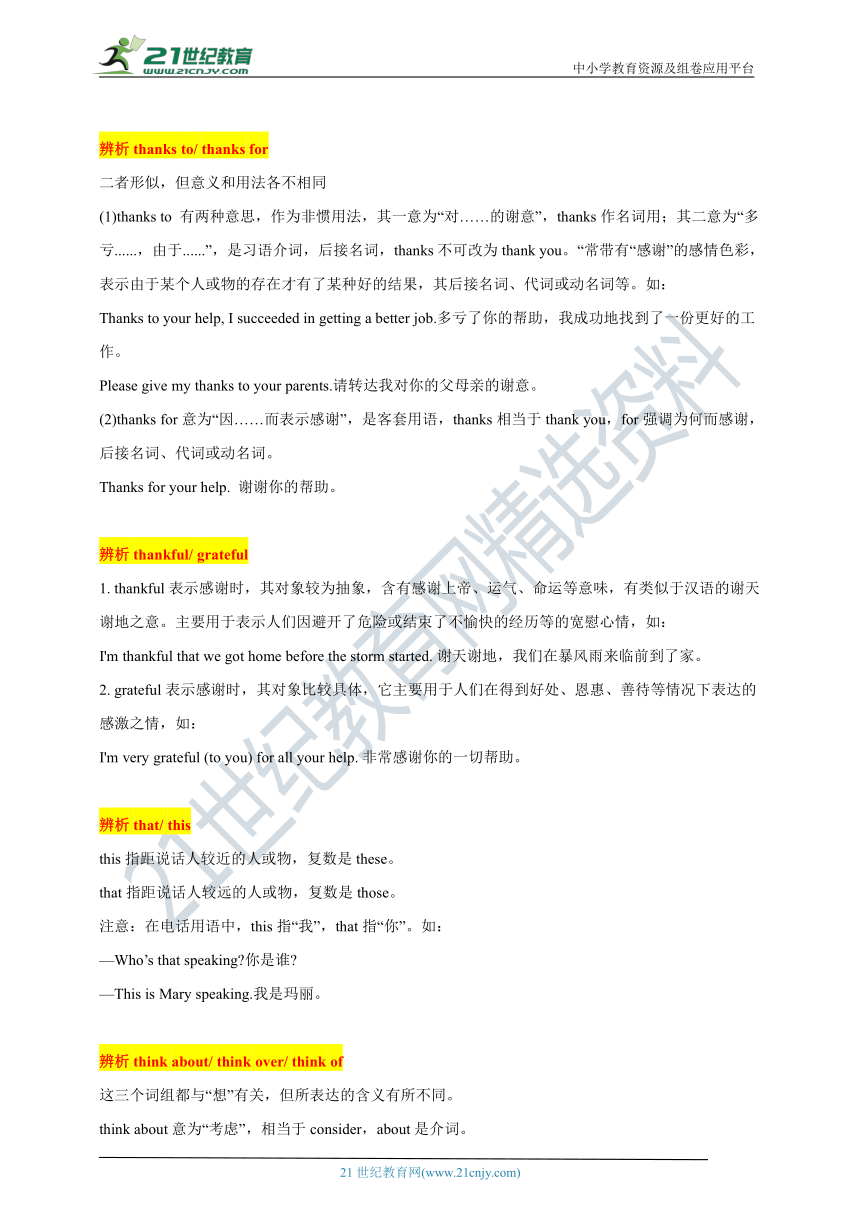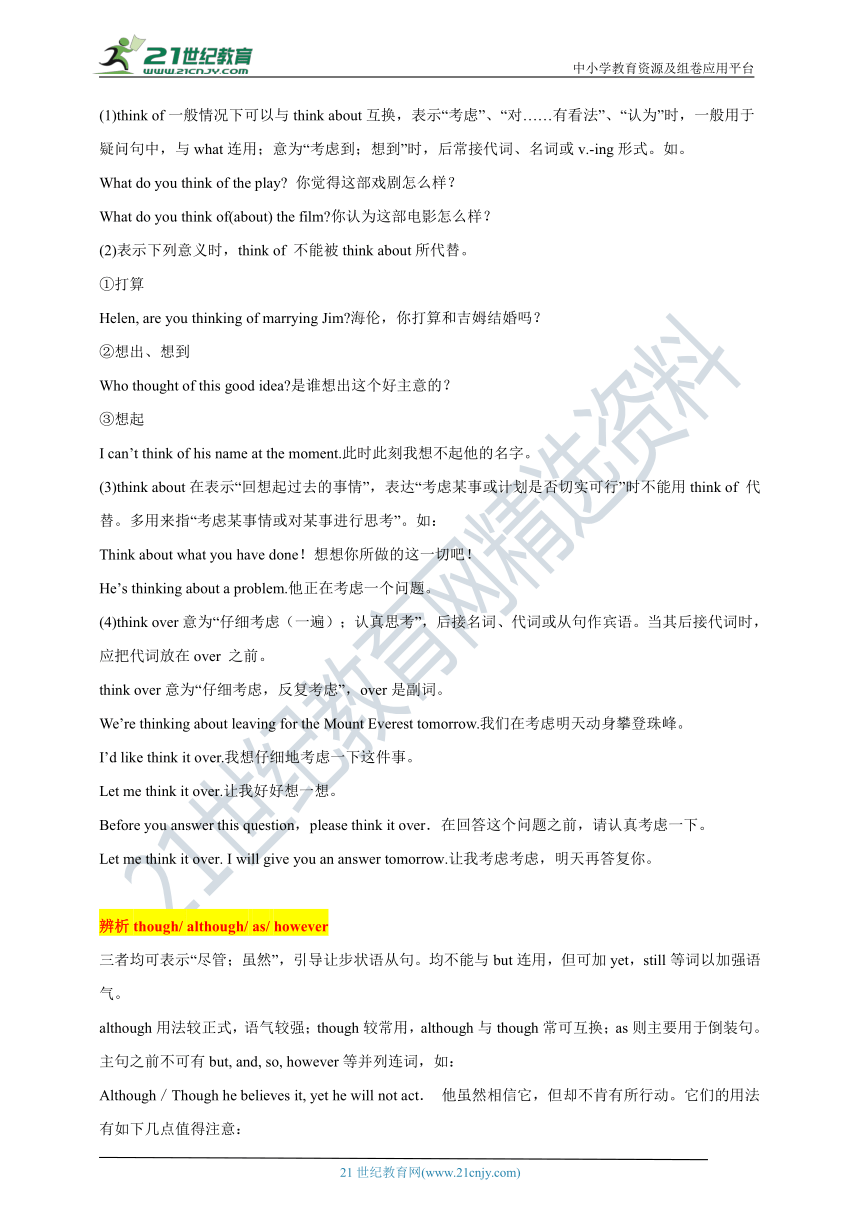30--中学英语同义词辨析大全(S4-T1)
文档属性
| 名称 | 30--中学英语同义词辨析大全(S4-T1) |

|
|
| 格式 | doc | ||
| 文件大小 | 1.2MB | ||
| 资源类型 | 试卷 | ||
| 版本资源 | 通用版 | ||
| 科目 | 英语 | ||
| 更新时间 | 2022-01-17 00:00:00 | ||
图片预览





文档简介
中小学教育资源及组卷应用平台
中学英语同义词辨析大全(S-T)
辨析symbol/ sign/ mark
这些名词均含“标志、象征、符号”之意。
symbol指作象征或表达某种深邃意蕴的特殊事物。
sign普通用词,指人们公认事物的记号,也可指某种情况的征兆。
mark普通用词,含义广泛。既可指方便于辨认而有意做的标记,又可指自然形成的标记或有别于他事物的特征。
辨析tall/ high
①指人、动物、树木等有生命的事物高时用tall,不用high。
②常指物体,如建筑物、山“高”时用tall或high都可以,一般用high,不过high的度比tall高。
How high is that tree 那棵树有多高
He can jump very high.他能跳很高。
表示某物或某人从顶部到底部的距离,反义词是short (矮);后者表示某物高出地面的距离,反义词是low(低)。比如父亲比儿子tall,但若儿子站到椅子上,则说儿子比父亲 high。另外,指人的高度时一般用tall,但是,若说出了人的具体高度, 则也可用 high:She is taller than me. 她比我高。/ He is six feet tall[high]. 他身高 6 英尺。
注意:high可以修饰price,表示“价格高”,表示“价格低”要用low来修饰,而不能用expensive,cheap来修饰price。
tall,high常指物体 He is tall.
辨析take/ grasp/ grab/ snatch/ seize
这些动词均有“抓住,握紧”之意。
take最普通用词,不带感彩。指用手抓、取某东西或控制某物。
grasp指紧紧抓住、抓牢。
grab指粗暴而急迫的抓住。
snatch指突然抢走,侧重动作更快或更具暴力性质。
seize指突然抓住某物,强调突然的猛烈动作。
辨析take advice/ take the(one's) advice
take advice征求意见。
take the advice接受忠告。如:
He refused to take the advice and failed again.
辨析take care of/ look after/ take care
take care of“一般情况下与look after含义相同,意为“爱护;照顾”,可互换使用,但look after没有“保管、保护”的意思。主要是对物品/ 动物的管理或保护,后跟名词或代词,不可单独使用。如:
I have to look after/ take care of my sick sister at home now.我现在不得不在家照顾生病的妹妹。
take care意为“注意;当心”,“一般用在祈使句中。可以单独使用,“主要是对物品/ 动物的管理或保护。其后也可以跟动词不定式,that从句。如:
Take care! The ice is thin.当心!冰很薄。
Take care that you don’t make yourself ill.当心不要生病。
辨析take place/ take the place of/ take one’s place
三者形似,但意义和用法各不相同
take place意为“发生”,为不及物动词短语。
take the place意为“代替,取代,接替”,是一个动词短语,可以作谓语。
take one’s place意为“入座,就座”,主语与one’s不一致时作“代替”解,此时相当于take the place of。
Great changes have taken place in my hometown since 2000.自从2000年以来我的家乡发生了巨大变化。
Electric trains have taken the place of steam trains in the 1970s.20世纪70年代,电力火车已取代了蒸汽火车。
Mr Green was ill, so Miss Black took his place.格林先生病了,布莱克小姐代替了他。
辨析technology/ technique
前者表示“技术”,是“科技”的总称,通常指工业技术或科学技术等,是指科学知识在实践(或某一行业的实践)中的总体运用,其含义较抽象,通常是不可数名词。
后者表示“技术”,是针对做某事的方法和技巧而言的,所以它通常可译为“技艺”或“技巧”等,尤其指音乐、艺术、体育、写作等方面的“技巧”。视含义的具体与抽象可用作可数或不可数名词。
Because of modern technology, we have a much higher standard of living.由于有了现代科技,我们的生活水平更高了。
Writing a novel requires great technique.写小说需要高超的技巧。
辨析telegram/ telegraph
两者均可表示“电报”,但telegram指通过电报发出的电文,通常用作可数名词;而telegraph则指用电报发送信息的通讯方式,通常用作不可数名词。但是表示“通过电报”时,本来应该用 by telegraph,但事实上也可用 by telegram。
辨析tell, speak, say与talk
tell意为“讲,告诉”,“可接双宾语,双宾语易位时用介词to引出间接宾语。tell sb. to do sth.表示“告诉某人做某事”。如:
I told him to wait for me at the bus stop.我告诉他在公共汽车站等我。
He told his parents the good news./He told the good news.his parents.他把这个好消息告诉了她父母。
speak强调单方的“说”或“讲”,“一般用作及物动词或不及物动词,要表示“对某人说(某事)”,可用 speak to/with sb. about sth.。可用来表示作演讲或具备说的能力,还可和语言类词汇搭配,表示说某种语言。如speak English“说英语”。如:
Please speak more slowly.请说慢一点。
I spoke to /with the chairman about my idea.我跟主席说了我的想法。
He can speak English well.他英语说得好。
The patient is too weak to speak.病人太虚弱了,不能说话。
say侧重于所说的内容,一般用作及物动词。表示“对某人说某事”,可用say sth. to sb.;say to sb.表示“对某人说”。如:
Did you say anything (to him) 你(对他)说了些什么?
He said to me that he would come to see rne the next week.他告诉我他会在下周来看望我。
talk侧重“谈话,说话”,一般作不及物动词,表示“同某人谈论(某事)”,可用talk to/with sb. (about sth.)。如:
What do you often talk about with your father 你:经常和你父亲谈些什么?
He was talking to/with a friend.他在同一位朋友谈话。
辨析terrify, scare
这些动词均有“惊吓、惊恐”之意。
terrify语气最强,指惊骇得六神无主,魂飞魄散。
scare指非正式文体中可与frighten换用,但语气较重,侧重人受惊吓后立即停下正在干的事或跑掉。
辨析thanks to/ thanks for
二者形似,但意义和用法各不相同
(1)thanks to 有两种意思,作为非惯用法,其一意为“对……的谢意”,thanks作名词用;其二意为“多亏......,由于......”,是习语介词,后接名词,thanks不可改为thank you。“常带有“感谢”的感彩,表示由于某个人或物的存在才有了某种好的结果,其后接名词、代词或动名词等。如:
Thanks to your help, I succeeded in getting a better job.多亏了你的帮助,我成功地找到了一份更好的工作。
Please give my thanks to your parents.请转达我对你的父母亲的谢意。
(2)thanks for意为“因……而表示感谢”,是客套用语,thanks相当于thank you,for强调为何而感谢,后接名词、代词或动名词。
Thanks for your help. 谢谢你的帮助。
辨析thankful/ grateful
1. thankful表示感谢时,其对象较为抽象,含有感谢上帝、运气、命运等意味,有类似于汉语的谢天谢地之意。主要用于表示人们因避开了危险或结束了不愉快的经历等的宽慰心情,如:
I'm thankful that we got home before the storm started. 谢天谢地,我们在暴风雨来临前到了家。2. grateful 表示感谢时,其对象比较具体,它主要用于人们在得到好处、恩惠、善待等情况下表达的感激之情,如:
I'm very grateful (to you) for all your help. 非常感谢你的一切帮助。
辨析that/ this
this指距说话人较近的人或物,复数是these。
that指距说话人较远的人或物,复数是those。
注意:在电话用语中,this指“我”,that指“你”。如:
—Who’s that speaking 你是谁
—This is Mary speaking.我是玛丽。
辨析think about/ think over/ think of
这三个词组都与“想”有关,但所表达的含义有所不同。
think about意为“考虑”,相当于consider,about是介词。
(1)think of一般情况下可以与think about互换,表示“考虑”、“对……有看法”、“认为”时,一般用于疑问句中,与what连用;意为“考虑到;想到”时,后常接代词、名词或v.-ing形式。如。
What do you think of the play 你觉得这部戏剧怎么样?
What do you think of(about) the film 你认为这部电影怎么样?
(2)表示下列意义时,think of 不能被think about所代替。
①打算
Helen, are you thinking of marrying Jim 海伦,你打算和吉姆结婚吗?
②想出、想到
Who thought of this good idea 是谁想出这个好主意的?
③想起
I can’t think of his name at the moment.此时此刻我想不起他的名字。
(3)think about在表示“回想起过去的事情”,表达“考虑某事或计划是否切实可行”时不能用think of 代替。多用来指“考虑某事情或对某事进行思考”。如:
Think about what you have done!想想你所做的这一切吧!
He’s thinking about a problem.他正在考虑一个问题。
(4)think over意为“仔细考虑(一遍);认真思考”,后接名词、代词或从句作宾语。当其后接代词时,应把代词放在over 之前。
think over意为“仔细考虑,反复考虑”,over是副词。
We’re thinking about leaving for the Mount Everest tomorrow.我们在考虑明天动身攀登珠峰。
I’d like think it over.我想仔细地考虑一下这件事。
Let me think it over.让我好好想一想。
Before you answer this question,please think it over.在回答这个问题之前,请认真考虑一下。
Let me think it over. I will give you an answer tomorrow.让我考虑考虑,明天再答复你。
辨析though/ although/ as/ however
三者均可表示“尽管;虽然”,引导让步状语从句。均不能与but连用,但可加yet,still等词以加强语气。
although用法较正式,语气较强;though较常用,although与though常可互换;as则主要用于倒装句。主句之前不可有but, and, so, however等并列连词,如:
Although/Though he believes it, yet he will not act. 他虽然相信它,但却不肯有所行动。它们的用法有如下几点值得注意:
(1)though:“虽然,尽管,即使”,还可以与even连用,even though即使,纵然。作副词时,一般不能置于句首,译作“然而,不过”。 though可以放在句末,表示“但是”,although却不能。例如:
They said they would come; they did not, though. 他们说他们会来,可是他们并没有来。
Though it was late, he went on working.虽然很晚了,但是他还在继续工作。
Although/Though he has a lot of money, yet/still he is unhappy.他虽然很有钱,但并不幸福。
He said he would come, he didn’t, though.他说他会来,然而他没来。
(2)although:“尽管;虽然”,只作连词,较正式,一般情况下可以用though替代。如:
He passed the exam although illness prevented him from attending class.虽然他曾因病耽误了学习,但他考试还是及格了。
Although he was seriously wounded, he still held out on the battle—field.他虽然身负重伤,但坚持不下火线。
although只用来陈述“事实”,不能表示“假设”。因此可以说even though“即使”以及as though“好像(=as if)”,不能说even although或as although。如:
I believe you are on duty—even though you’re in plain clothes.尽管你穿着便衣,我相信你是在值勤。
(3)as表示“尽管;虽然”,只能用于倒装句,即:将表语、状语或谓语动词放在as之前。though也可这么用。如:
Young as/though he is, he knows a lot.他虽然年纪不大,却懂得很多。
注意:如果表语是单数名词,要省略a。如:
Child as/though he is, he can speak two foreign languages.虽然他是个孩子,但他会说两门外语。
however是副词,意为“然而”,必须放在另一句之首。如:
Although I left home earlier, I was late for school.
= I was late for school, even though I left home earlier.
= I left home earlier. However. I was late for school.
= I left home earlier. I was late for school though.
辨析though/ although/ as
这些连词均可表示“虽然,尽管”之意。
though和although在意义上几乎毫无区别,但文体上后者是较正式用词,语气比though强,并且,多引导陈述语气的让步状语从句,多引导陈述语气的让步状语从句。此外,在习惯用法上这两个词仍有以下一些差异:
1.though可引出倒装语序的让步状语从句,although 则不能。Though引导的从句指某种假设情况时,要用虚拟语气,although没有这种用法。
2.though可与even连用,although则不能;短语as though“好像,仿佛”,even though“即使,纵然”等短语中,只用though,不能用although。
3.though可以置于从句末,而although则不能。
4.引出省略句时,通常用though。
as引出让步状语从句只用于倒装语序结构中,语气强于上述两个连词。
Although / Though he was seriously wounded, he still held out on the battle-field.他虽然身负重伤,但坚持不下火线。
Child though he was, he did quite well.虽然他只是个孩子,但干得很好。
He talks as though he knew anything.他夸夸其谈好像无所不知。
辨析three of us/ the three of us
three of us我们(不止三个)中的三个。
the three of us我们三个(就三个人)。如:
The three of us---Tom, Jack and I went to the cinema.
辨析throughout/ all over/ all through
三者意义相近,但用法不同
all throughout介词,表示时间时,指“自始至终,在……期间”;表示区域时,指“遍及……地域,遍及……”。
all over意为“遍及……的各部分”,一般接表示地点的名词,还可作“结束;全身”解。
all thmugh意为“在整个……时期,一直地”,接表时间的名词。
It poured with rain throughout the night.大雨下了整整一夜。
The news came to Being spread throughout the whole city.那个消息传遍了整个城市。
We have friends all over the world.我们的朋友遍天下。
He remained there all through the year.他在那里呆了一整年。
辨析till/ until
这两个词都有“到……之时;直至”之意。
till和until都可以用作连词和介词,用于肯定句和否定句。用于肯定句时,只与持续性动词连用,表示“到……为止”。用于否定句时,通常与瞬间动词连用,也可与持续性动词连用,表示“直到……才”的意思。这两个词一般情况下可以相互使换用。如:
We waited for him until/till six o’clock.我们等他一直等到六点钟。
The pupil will not begin the meeting till/until their class supervisor comes.学生们等到班主任一到就开始开会。
They didn’t talk until/till the interpreter came.知道译员到,他们才交谈。
He did not go to bed until/till he had made sure that nothing was wrong with the pipes.他检查水管,确准它们没有毛病,才去睡觉。其用法归纳于下:
(1)用于肯定句中,意为“到……(的时候)为止”,谓语动词一般是延续性的,表示动作一直延续到till(until)所表示的时间为止。如:
You’d better stay in bed till tomorrow.你最好卧床到明天。
We worked till/ until lunch time.我们一直工作到吃午饭的时间。
(2)用在否定句中,意为“直到……才……”,表示谓语动词的动作直到till/ until 所表示的时间才发生。如:
I didn’t know the fact until I read your letter.我读了你的信后才知道真相。
She didn’t go to bed till/ until she finished her homework.昨天晚上她做完家庭作业才睡觉。
(3)until比till稍正式,且位于句首时多用 until。如:
Until he was 16, he had never been away from his village.十六岁以后他才离开家乡。
(4)在下列句型中只能用until,而不能用till。
A. 在倒装句中,not until位于句首时,till不可代替until。
Not until 9 o’clock did the meeting begin.直到九点钟会议才开始。
B.在It is not until…that强调句型中。如:
It was not until the bell rang that the students stopped talking.直到上课铃响了,学生们才停止谈话。
注意:当主句使用一般将来时时,till和until引导的从句应用一般现在时表示将来,不用将来时。
I shall wait here till Mary arrives.我要在这等到玛丽来为止。-
Alice won’t leave until her b/friend comes.到她男朋友来了爱丽丝才会离开。
辨析too/ very
这两个副词均可表示“大,很”之意。
too指超过了承受能力或程度,即程度加到了不适当的地步。
very用于加强程度,可修饰褒义词和贬义词。
辨析total/ sum/ whole/ amount/ number
这些名词均有“总数、全体”之意。
total形容词,意为“总计的,全部的”,指总和,强调满打满算。指总量之大,强调每一构成部分或成分均被计算在内。
sum指两个或更多的数目相加的总和。意为“总数,总和”,指简单加算的结果,也可指钱的“金额”。
whole着重其中没有部分或成分被忽略不计。
amount指累加的结果,一般与不可数名词连用。
number强调“数”的概念,经常与可数名词复数连用。
A total of 200 people visited the palace today:全天总计有200人参观了这座宫殿。
He could only pay half the amount he owed.他只能付清欠款的一半。
The number of Beijing 101 High School grads entering the national key universities is increasing.北京101中学进入全国重点大学的毕业生人数正增加。
The affluent 2nd generation can inherit a princely sum from their parents.富二代可以从他们父母那里继承一大笔财富。
辨析towards/ to
这两个词都有“向、朝、对于”之意,但用法不同。
(1)towards 表示“向着某个方向”,没有“到达”之意。,,强调方向,也可以跟时间名词,表示“接近……,……左右”。如:
They saw a dog coming towards them.他们看见一只狗朝他们走过来。
(2)to一般接在come\go\move\return等动词后,表示“向、往”,有“到达”之意。表示到达,强调目的地。二者表示“方向”时,可以互换。如:
It was raining when I came to school this morning.今天早上我赶到学校的时候,正下着大雨。
try on/ try out
try on指“试穿(衣服、鞋子)”及“试戴(帽子)”等,其中的on为副词,当宾语是代词时,该宾语要放在on之前;如果宾语是名词,该宾语放在on之前或之后均可。例如:
try on a coat=try a coat on 试穿衣服 The new hat is for you.Please try it on. 这新帽子是给你的,请试试看。
try out指“试验或试用”某种机器、理论或方法,其中的out为副词,当宾语是代词时,try out要分开用。如:
We tried out this new crop on a large area last year.去年我们大面积试种这种新庄稼。
I'll try it out and see if it works.我来试试看能否行得通。
21世纪教育网 www.21cnjy.com 精品试卷·第 2 页 (共 2 页)
HYPERLINK "http://21世纪教育网(www.21cnjy.com)
" 21世纪教育网(www.21cnjy.com)
中学英语同义词辨析大全(S-T)
辨析symbol/ sign/ mark
这些名词均含“标志、象征、符号”之意。
symbol指作象征或表达某种深邃意蕴的特殊事物。
sign普通用词,指人们公认事物的记号,也可指某种情况的征兆。
mark普通用词,含义广泛。既可指方便于辨认而有意做的标记,又可指自然形成的标记或有别于他事物的特征。
辨析tall/ high
①指人、动物、树木等有生命的事物高时用tall,不用high。
②常指物体,如建筑物、山“高”时用tall或high都可以,一般用high,不过high的度比tall高。
How high is that tree 那棵树有多高
He can jump very high.他能跳很高。
表示某物或某人从顶部到底部的距离,反义词是short (矮);后者表示某物高出地面的距离,反义词是low(低)。比如父亲比儿子tall,但若儿子站到椅子上,则说儿子比父亲 high。另外,指人的高度时一般用tall,但是,若说出了人的具体高度, 则也可用 high:She is taller than me. 她比我高。/ He is six feet tall[high]. 他身高 6 英尺。
注意:high可以修饰price,表示“价格高”,表示“价格低”要用low来修饰,而不能用expensive,cheap来修饰price。
tall,high常指物体 He is tall.
辨析take/ grasp/ grab/ snatch/ seize
这些动词均有“抓住,握紧”之意。
take最普通用词,不带感彩。指用手抓、取某东西或控制某物。
grasp指紧紧抓住、抓牢。
grab指粗暴而急迫的抓住。
snatch指突然抢走,侧重动作更快或更具暴力性质。
seize指突然抓住某物,强调突然的猛烈动作。
辨析take advice/ take the(one's) advice
take advice征求意见。
take the advice接受忠告。如:
He refused to take the advice and failed again.
辨析take care of/ look after/ take care
take care of“一般情况下与look after含义相同,意为“爱护;照顾”,可互换使用,但look after没有“保管、保护”的意思。主要是对物品/ 动物的管理或保护,后跟名词或代词,不可单独使用。如:
I have to look after/ take care of my sick sister at home now.我现在不得不在家照顾生病的妹妹。
take care意为“注意;当心”,“一般用在祈使句中。可以单独使用,“主要是对物品/ 动物的管理或保护。其后也可以跟动词不定式,that从句。如:
Take care! The ice is thin.当心!冰很薄。
Take care that you don’t make yourself ill.当心不要生病。
辨析take place/ take the place of/ take one’s place
三者形似,但意义和用法各不相同
take place意为“发生”,为不及物动词短语。
take the place意为“代替,取代,接替”,是一个动词短语,可以作谓语。
take one’s place意为“入座,就座”,主语与one’s不一致时作“代替”解,此时相当于take the place of。
Great changes have taken place in my hometown since 2000.自从2000年以来我的家乡发生了巨大变化。
Electric trains have taken the place of steam trains in the 1970s.20世纪70年代,电力火车已取代了蒸汽火车。
Mr Green was ill, so Miss Black took his place.格林先生病了,布莱克小姐代替了他。
辨析technology/ technique
前者表示“技术”,是“科技”的总称,通常指工业技术或科学技术等,是指科学知识在实践(或某一行业的实践)中的总体运用,其含义较抽象,通常是不可数名词。
后者表示“技术”,是针对做某事的方法和技巧而言的,所以它通常可译为“技艺”或“技巧”等,尤其指音乐、艺术、体育、写作等方面的“技巧”。视含义的具体与抽象可用作可数或不可数名词。
Because of modern technology, we have a much higher standard of living.由于有了现代科技,我们的生活水平更高了。
Writing a novel requires great technique.写小说需要高超的技巧。
辨析telegram/ telegraph
两者均可表示“电报”,但telegram指通过电报发出的电文,通常用作可数名词;而telegraph则指用电报发送信息的通讯方式,通常用作不可数名词。但是表示“通过电报”时,本来应该用 by telegraph,但事实上也可用 by telegram。
辨析tell, speak, say与talk
tell意为“讲,告诉”,“可接双宾语,双宾语易位时用介词to引出间接宾语。tell sb. to do sth.表示“告诉某人做某事”。如:
I told him to wait for me at the bus stop.我告诉他在公共汽车站等我。
He told his parents the good news./He told the good news.his parents.他把这个好消息告诉了她父母。
speak强调单方的“说”或“讲”,“一般用作及物动词或不及物动词,要表示“对某人说(某事)”,可用 speak to/with sb. about sth.。可用来表示作演讲或具备说的能力,还可和语言类词汇搭配,表示说某种语言。如speak English“说英语”。如:
Please speak more slowly.请说慢一点。
I spoke to /with the chairman about my idea.我跟主席说了我的想法。
He can speak English well.他英语说得好。
The patient is too weak to speak.病人太虚弱了,不能说话。
say侧重于所说的内容,一般用作及物动词。表示“对某人说某事”,可用say sth. to sb.;say to sb.表示“对某人说”。如:
Did you say anything (to him) 你(对他)说了些什么?
He said to me that he would come to see rne the next week.他告诉我他会在下周来看望我。
talk侧重“谈话,说话”,一般作不及物动词,表示“同某人谈论(某事)”,可用talk to/with sb. (about sth.)。如:
What do you often talk about with your father 你:经常和你父亲谈些什么?
He was talking to/with a friend.他在同一位朋友谈话。
辨析terrify, scare
这些动词均有“惊吓、惊恐”之意。
terrify语气最强,指惊骇得六神无主,魂飞魄散。
scare指非正式文体中可与frighten换用,但语气较重,侧重人受惊吓后立即停下正在干的事或跑掉。
辨析thanks to/ thanks for
二者形似,但意义和用法各不相同
(1)thanks to 有两种意思,作为非惯用法,其一意为“对……的谢意”,thanks作名词用;其二意为“多亏......,由于......”,是习语介词,后接名词,thanks不可改为thank you。“常带有“感谢”的感彩,表示由于某个人或物的存在才有了某种好的结果,其后接名词、代词或动名词等。如:
Thanks to your help, I succeeded in getting a better job.多亏了你的帮助,我成功地找到了一份更好的工作。
Please give my thanks to your parents.请转达我对你的父母亲的谢意。
(2)thanks for意为“因……而表示感谢”,是客套用语,thanks相当于thank you,for强调为何而感谢,后接名词、代词或动名词。
Thanks for your help. 谢谢你的帮助。
辨析thankful/ grateful
1. thankful表示感谢时,其对象较为抽象,含有感谢上帝、运气、命运等意味,有类似于汉语的谢天谢地之意。主要用于表示人们因避开了危险或结束了不愉快的经历等的宽慰心情,如:
I'm thankful that we got home before the storm started. 谢天谢地,我们在暴风雨来临前到了家。2. grateful 表示感谢时,其对象比较具体,它主要用于人们在得到好处、恩惠、善待等情况下表达的感激之情,如:
I'm very grateful (to you) for all your help. 非常感谢你的一切帮助。
辨析that/ this
this指距说话人较近的人或物,复数是these。
that指距说话人较远的人或物,复数是those。
注意:在电话用语中,this指“我”,that指“你”。如:
—Who’s that speaking 你是谁
—This is Mary speaking.我是玛丽。
辨析think about/ think over/ think of
这三个词组都与“想”有关,但所表达的含义有所不同。
think about意为“考虑”,相当于consider,about是介词。
(1)think of一般情况下可以与think about互换,表示“考虑”、“对……有看法”、“认为”时,一般用于疑问句中,与what连用;意为“考虑到;想到”时,后常接代词、名词或v.-ing形式。如。
What do you think of the play 你觉得这部戏剧怎么样?
What do you think of(about) the film 你认为这部电影怎么样?
(2)表示下列意义时,think of 不能被think about所代替。
①打算
Helen, are you thinking of marrying Jim 海伦,你打算和吉姆结婚吗?
②想出、想到
Who thought of this good idea 是谁想出这个好主意的?
③想起
I can’t think of his name at the moment.此时此刻我想不起他的名字。
(3)think about在表示“回想起过去的事情”,表达“考虑某事或计划是否切实可行”时不能用think of 代替。多用来指“考虑某事情或对某事进行思考”。如:
Think about what you have done!想想你所做的这一切吧!
He’s thinking about a problem.他正在考虑一个问题。
(4)think over意为“仔细考虑(一遍);认真思考”,后接名词、代词或从句作宾语。当其后接代词时,应把代词放在over 之前。
think over意为“仔细考虑,反复考虑”,over是副词。
We’re thinking about leaving for the Mount Everest tomorrow.我们在考虑明天动身攀登珠峰。
I’d like think it over.我想仔细地考虑一下这件事。
Let me think it over.让我好好想一想。
Before you answer this question,please think it over.在回答这个问题之前,请认真考虑一下。
Let me think it over. I will give you an answer tomorrow.让我考虑考虑,明天再答复你。
辨析though/ although/ as/ however
三者均可表示“尽管;虽然”,引导让步状语从句。均不能与but连用,但可加yet,still等词以加强语气。
although用法较正式,语气较强;though较常用,although与though常可互换;as则主要用于倒装句。主句之前不可有but, and, so, however等并列连词,如:
Although/Though he believes it, yet he will not act. 他虽然相信它,但却不肯有所行动。它们的用法有如下几点值得注意:
(1)though:“虽然,尽管,即使”,还可以与even连用,even though即使,纵然。作副词时,一般不能置于句首,译作“然而,不过”。 though可以放在句末,表示“但是”,although却不能。例如:
They said they would come; they did not, though. 他们说他们会来,可是他们并没有来。
Though it was late, he went on working.虽然很晚了,但是他还在继续工作。
Although/Though he has a lot of money, yet/still he is unhappy.他虽然很有钱,但并不幸福。
He said he would come, he didn’t, though.他说他会来,然而他没来。
(2)although:“尽管;虽然”,只作连词,较正式,一般情况下可以用though替代。如:
He passed the exam although illness prevented him from attending class.虽然他曾因病耽误了学习,但他考试还是及格了。
Although he was seriously wounded, he still held out on the battle—field.他虽然身负重伤,但坚持不下火线。
although只用来陈述“事实”,不能表示“假设”。因此可以说even though“即使”以及as though“好像(=as if)”,不能说even although或as although。如:
I believe you are on duty—even though you’re in plain clothes.尽管你穿着便衣,我相信你是在值勤。
(3)as表示“尽管;虽然”,只能用于倒装句,即:将表语、状语或谓语动词放在as之前。though也可这么用。如:
Young as/though he is, he knows a lot.他虽然年纪不大,却懂得很多。
注意:如果表语是单数名词,要省略a。如:
Child as/though he is, he can speak two foreign languages.虽然他是个孩子,但他会说两门外语。
however是副词,意为“然而”,必须放在另一句之首。如:
Although I left home earlier, I was late for school.
= I was late for school, even though I left home earlier.
= I left home earlier. However. I was late for school.
= I left home earlier. I was late for school though.
辨析though/ although/ as
这些连词均可表示“虽然,尽管”之意。
though和although在意义上几乎毫无区别,但文体上后者是较正式用词,语气比though强,并且,多引导陈述语气的让步状语从句,多引导陈述语气的让步状语从句。此外,在习惯用法上这两个词仍有以下一些差异:
1.though可引出倒装语序的让步状语从句,although 则不能。Though引导的从句指某种假设情况时,要用虚拟语气,although没有这种用法。
2.though可与even连用,although则不能;短语as though“好像,仿佛”,even though“即使,纵然”等短语中,只用though,不能用although。
3.though可以置于从句末,而although则不能。
4.引出省略句时,通常用though。
as引出让步状语从句只用于倒装语序结构中,语气强于上述两个连词。
Although / Though he was seriously wounded, he still held out on the battle-field.他虽然身负重伤,但坚持不下火线。
Child though he was, he did quite well.虽然他只是个孩子,但干得很好。
He talks as though he knew anything.他夸夸其谈好像无所不知。
辨析three of us/ the three of us
three of us我们(不止三个)中的三个。
the three of us我们三个(就三个人)。如:
The three of us---Tom, Jack and I went to the cinema.
辨析throughout/ all over/ all through
三者意义相近,但用法不同
all throughout介词,表示时间时,指“自始至终,在……期间”;表示区域时,指“遍及……地域,遍及……”。
all over意为“遍及……的各部分”,一般接表示地点的名词,还可作“结束;全身”解。
all thmugh意为“在整个……时期,一直地”,接表时间的名词。
It poured with rain throughout the night.大雨下了整整一夜。
The news came to Being spread throughout the whole city.那个消息传遍了整个城市。
We have friends all over the world.我们的朋友遍天下。
He remained there all through the year.他在那里呆了一整年。
辨析till/ until
这两个词都有“到……之时;直至”之意。
till和until都可以用作连词和介词,用于肯定句和否定句。用于肯定句时,只与持续性动词连用,表示“到……为止”。用于否定句时,通常与瞬间动词连用,也可与持续性动词连用,表示“直到……才”的意思。这两个词一般情况下可以相互使换用。如:
We waited for him until/till six o’clock.我们等他一直等到六点钟。
The pupil will not begin the meeting till/until their class supervisor comes.学生们等到班主任一到就开始开会。
They didn’t talk until/till the interpreter came.知道译员到,他们才交谈。
He did not go to bed until/till he had made sure that nothing was wrong with the pipes.他检查水管,确准它们没有毛病,才去睡觉。其用法归纳于下:
(1)用于肯定句中,意为“到……(的时候)为止”,谓语动词一般是延续性的,表示动作一直延续到till(until)所表示的时间为止。如:
You’d better stay in bed till tomorrow.你最好卧床到明天。
We worked till/ until lunch time.我们一直工作到吃午饭的时间。
(2)用在否定句中,意为“直到……才……”,表示谓语动词的动作直到till/ until 所表示的时间才发生。如:
I didn’t know the fact until I read your letter.我读了你的信后才知道真相。
She didn’t go to bed till/ until she finished her homework.昨天晚上她做完家庭作业才睡觉。
(3)until比till稍正式,且位于句首时多用 until。如:
Until he was 16, he had never been away from his village.十六岁以后他才离开家乡。
(4)在下列句型中只能用until,而不能用till。
A. 在倒装句中,not until位于句首时,till不可代替until。
Not until 9 o’clock did the meeting begin.直到九点钟会议才开始。
B.在It is not until…that强调句型中。如:
It was not until the bell rang that the students stopped talking.直到上课铃响了,学生们才停止谈话。
注意:当主句使用一般将来时时,till和until引导的从句应用一般现在时表示将来,不用将来时。
I shall wait here till Mary arrives.我要在这等到玛丽来为止。-
Alice won’t leave until her b/friend comes.到她男朋友来了爱丽丝才会离开。
辨析too/ very
这两个副词均可表示“大,很”之意。
too指超过了承受能力或程度,即程度加到了不适当的地步。
very用于加强程度,可修饰褒义词和贬义词。
辨析total/ sum/ whole/ amount/ number
这些名词均有“总数、全体”之意。
total形容词,意为“总计的,全部的”,指总和,强调满打满算。指总量之大,强调每一构成部分或成分均被计算在内。
sum指两个或更多的数目相加的总和。意为“总数,总和”,指简单加算的结果,也可指钱的“金额”。
whole着重其中没有部分或成分被忽略不计。
amount指累加的结果,一般与不可数名词连用。
number强调“数”的概念,经常与可数名词复数连用。
A total of 200 people visited the palace today:全天总计有200人参观了这座宫殿。
He could only pay half the amount he owed.他只能付清欠款的一半。
The number of Beijing 101 High School grads entering the national key universities is increasing.北京101中学进入全国重点大学的毕业生人数正增加。
The affluent 2nd generation can inherit a princely sum from their parents.富二代可以从他们父母那里继承一大笔财富。
辨析towards/ to
这两个词都有“向、朝、对于”之意,但用法不同。
(1)towards 表示“向着某个方向”,没有“到达”之意。,,强调方向,也可以跟时间名词,表示“接近……,……左右”。如:
They saw a dog coming towards them.他们看见一只狗朝他们走过来。
(2)to一般接在come\go\move\return等动词后,表示“向、往”,有“到达”之意。表示到达,强调目的地。二者表示“方向”时,可以互换。如:
It was raining when I came to school this morning.今天早上我赶到学校的时候,正下着大雨。
try on/ try out
try on指“试穿(衣服、鞋子)”及“试戴(帽子)”等,其中的on为副词,当宾语是代词时,该宾语要放在on之前;如果宾语是名词,该宾语放在on之前或之后均可。例如:
try on a coat=try a coat on 试穿衣服 The new hat is for you.Please try it on. 这新帽子是给你的,请试试看。
try out指“试验或试用”某种机器、理论或方法,其中的out为副词,当宾语是代词时,try out要分开用。如:
We tried out this new crop on a large area last year.去年我们大面积试种这种新庄稼。
I'll try it out and see if it works.我来试试看能否行得通。
21世纪教育网 www.21cnjy.com 精品试卷·第 2 页 (共 2 页)
HYPERLINK "http://21世纪教育网(www.21cnjy.com)
" 21世纪教育网(www.21cnjy.com)
同课章节目录
- 词法
- 名词
- 动词和动词短语
- 动词语态
- 动词时态
- 助动词和情态动词
- 非谓语动词
- 冠词
- 代词
- 数词和量词
- 形容词副词及其比较等级
- 介词和介词短语
- 连词和感叹词
- 构词法
- 相似、相近词比较
- 句法
- 陈述句
- 一般疑问句和否定疑问句
- 特殊疑问句及选择疑问句
- 反意疑问句
- 存在句(There be句型)
- 宾语从句
- 定语从句
- 状语从句
- 主谓一致问题
- 简单句
- 并列句
- 复合句
- 主谓一致
- 主、表语从句
- 名词性从句
- 直接引语和间接引语
- 虚拟语气
- 感叹句
- 强调句
- 倒装句
- 祈使句
- 句子的成分
- 句子的分类
- 题型专区
- 单项选择部分
- 易错题
- 完形填空
- 阅读理解
- 词汇练习
- 听说训练
- 句型转换
- 补全对话
- 短文改错
- 翻译
- 书面表达
- 任务型阅读
- 语法填空
- 其他资料
